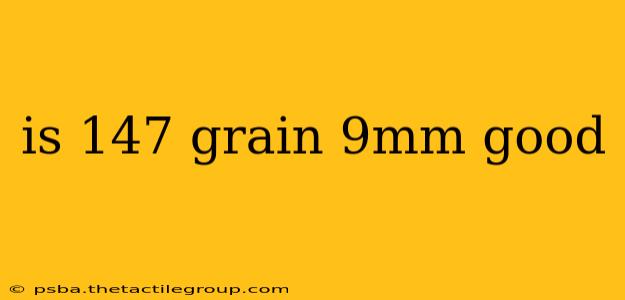Is 147 Grain 9mm Ammo Good? A Comprehensive Look at Weight, Performance, and Applications
The question of whether 147-grain 9mm ammunition is "good" is subjective and depends heavily on the intended application. There's no single right answer, but a deep dive into its characteristics will help you decide if it's the right choice for your needs.
Understanding the Significance of Grain Weight
The "grain" measurement refers to the bullet's weight. A 147-grain 9mm bullet is significantly heavier than the more common 115-grain or 124-grain rounds. This weight difference dramatically impacts several key performance aspects:
Advantages of 147 Grain 9mm:
- Reduced Recoil: The heavier bullet translates to less felt recoil, making it more comfortable for practice and potentially improving accuracy, especially for shooters new to handguns or those with smaller builds.
- Superior Penetration: This is arguably the most significant advantage. The heavier bullet retains its energy and momentum over longer distances, resulting in deeper penetration into targets. This is crucial in self-defense scenarios where complete incapacitation is paramount.
- Lower Muzzle Rise: The reduced recoil also contributes to lower muzzle rise, allowing for faster follow-up shots and improved target acquisition.
- Subsonic Velocity: Many 147-grain 9mm rounds are subsonic, meaning they travel slower than the speed of sound. This is beneficial for suppressed firearms, as it significantly reduces the sound signature.
Disadvantages of 147 Grain 9mm:
- Lower Velocity: Compared to lighter-grain ammunition, 147-grain rounds have a lower muzzle velocity. This means a flatter trajectory over longer ranges is less pronounced.
- Potential for Overpenetration: While the superior penetration is an advantage in some situations, it also increases the risk of overpenetration, which is a significant safety concern in populated areas. A round that passes cleanly through a target can pose a danger to bystanders.
- Cost: 147-grain ammunition is often more expensive than lighter-grain options.
Ideal Applications for 147 Grain 9mm:
- Self-Defense: The combination of high penetration and reduced recoil makes it a popular choice for self-defense, especially in situations where barriers might be encountered.
- Law Enforcement: Law enforcement agencies often favor 147-grain 9mm for its penetration capabilities and reduced risk of overpenetration (when compared to full metal jacket rounds).
- Competitive Shooting (Limited Divisions): Certain competitive shooting disciplines might have specific weight restrictions that favor 147-grain ammo.
- Suppressed Firearms: The subsonic velocity of many 147-grain rounds makes them ideal for use with suppressors.
Conclusion: Is it "Good"?
Ultimately, the "goodness" of 147-grain 9mm ammunition is determined by its suitability for your specific needs. Consider the advantages and disadvantages carefully, weighing the factors of recoil, penetration, velocity, cost, and your intended application. If deep penetration and reduced recoil are priorities, 147-grain 9mm is an excellent choice. However, if velocity and cost are major concerns, lighter grain options might be more appropriate. Thorough research and perhaps even some range time with different grain weights are recommended before making a decision. Remember always to prioritize safety and practice responsible firearm handling.

